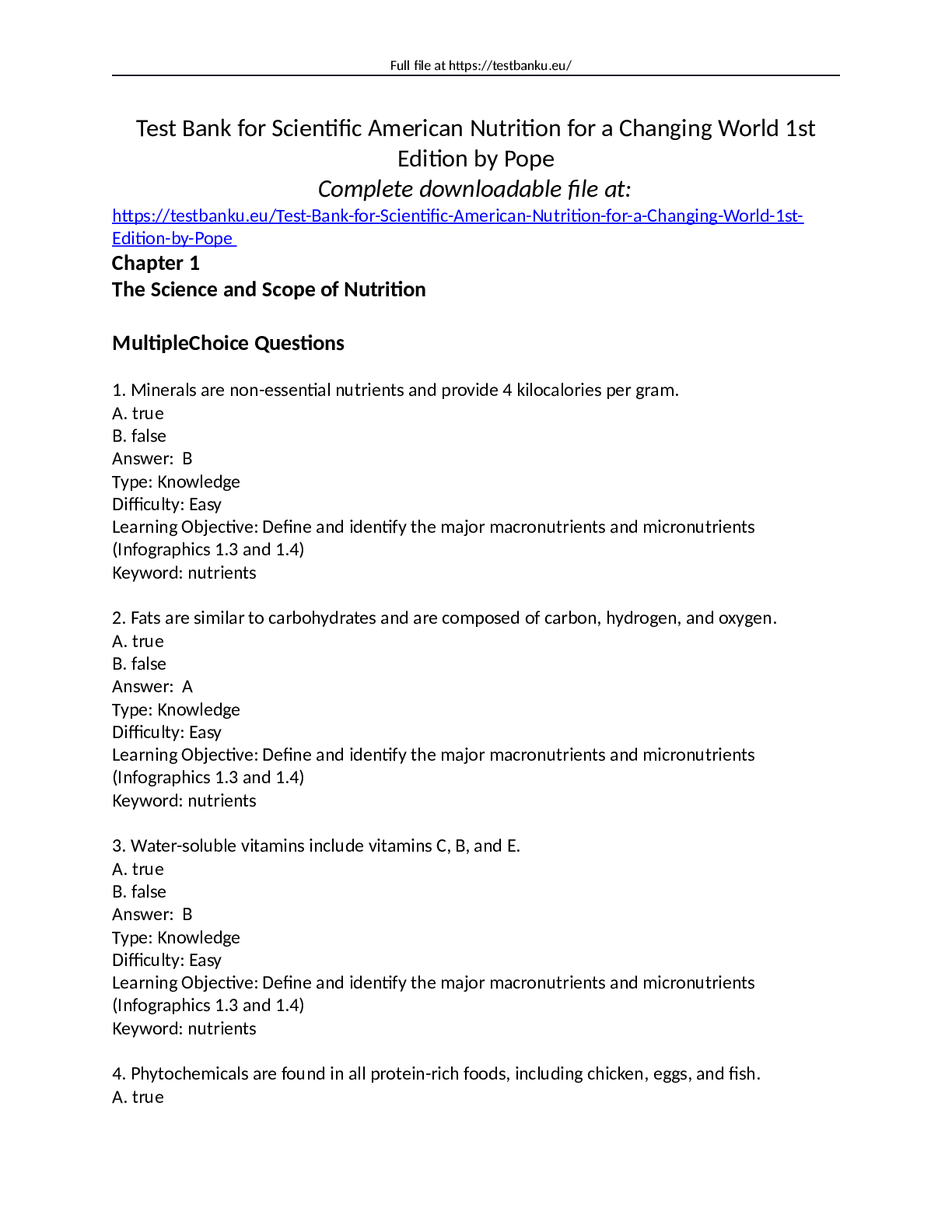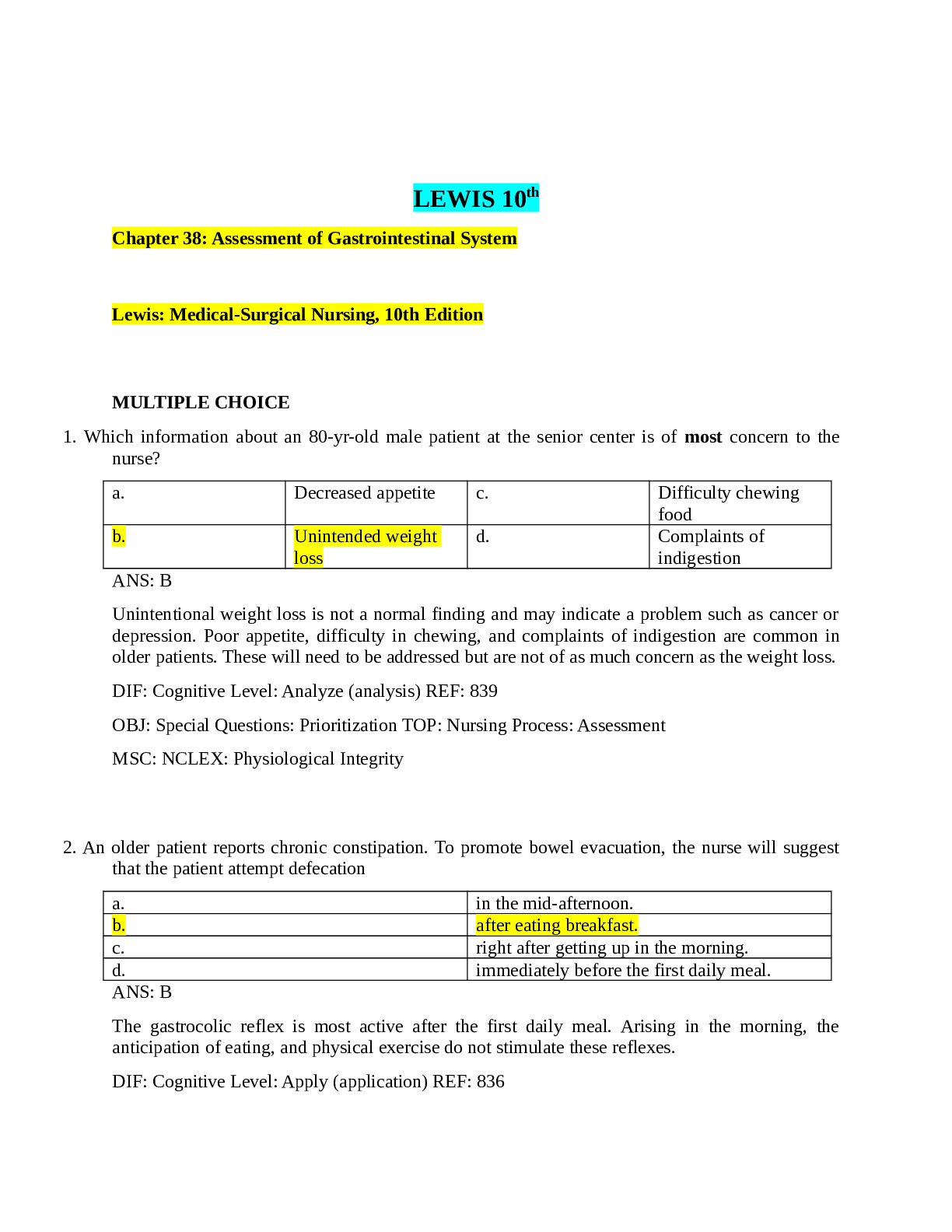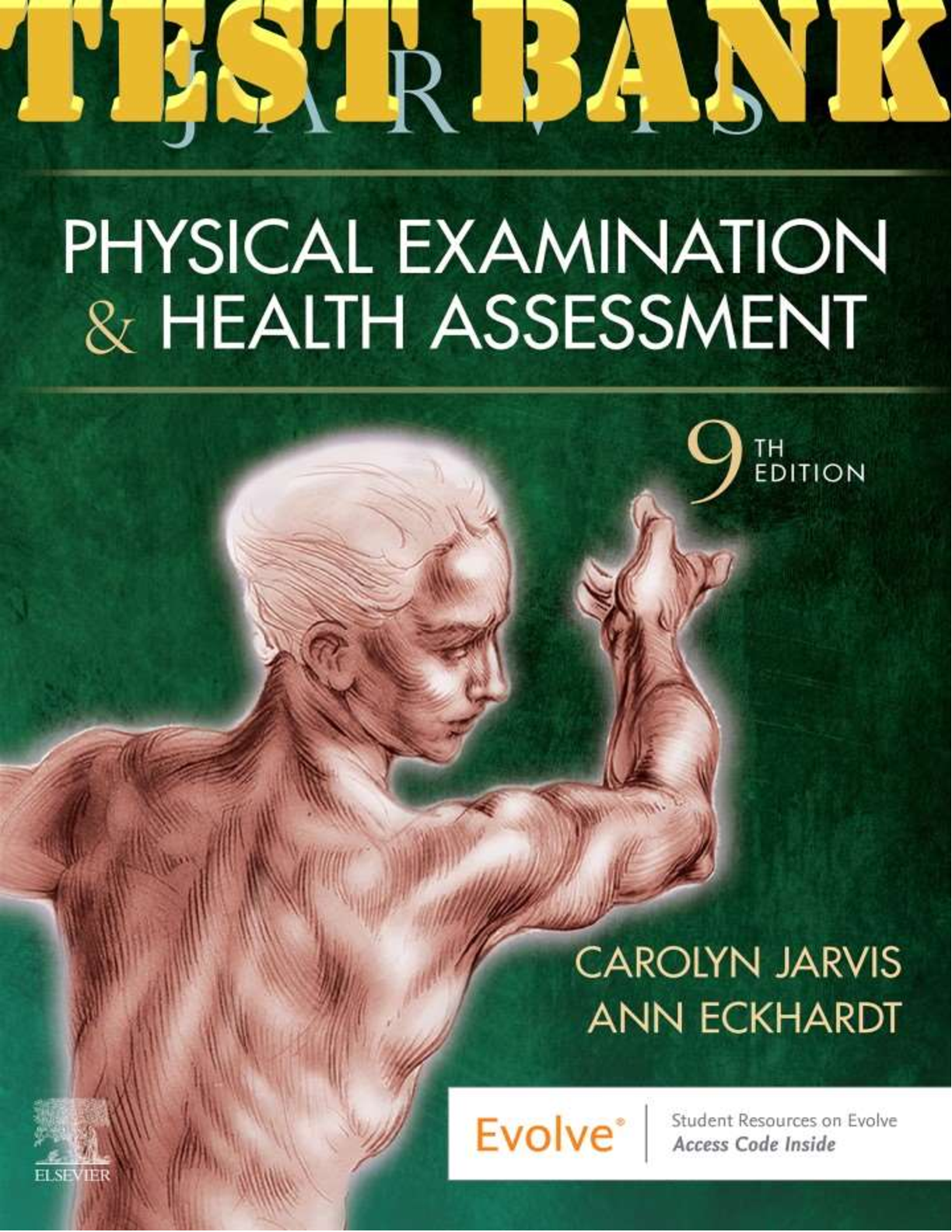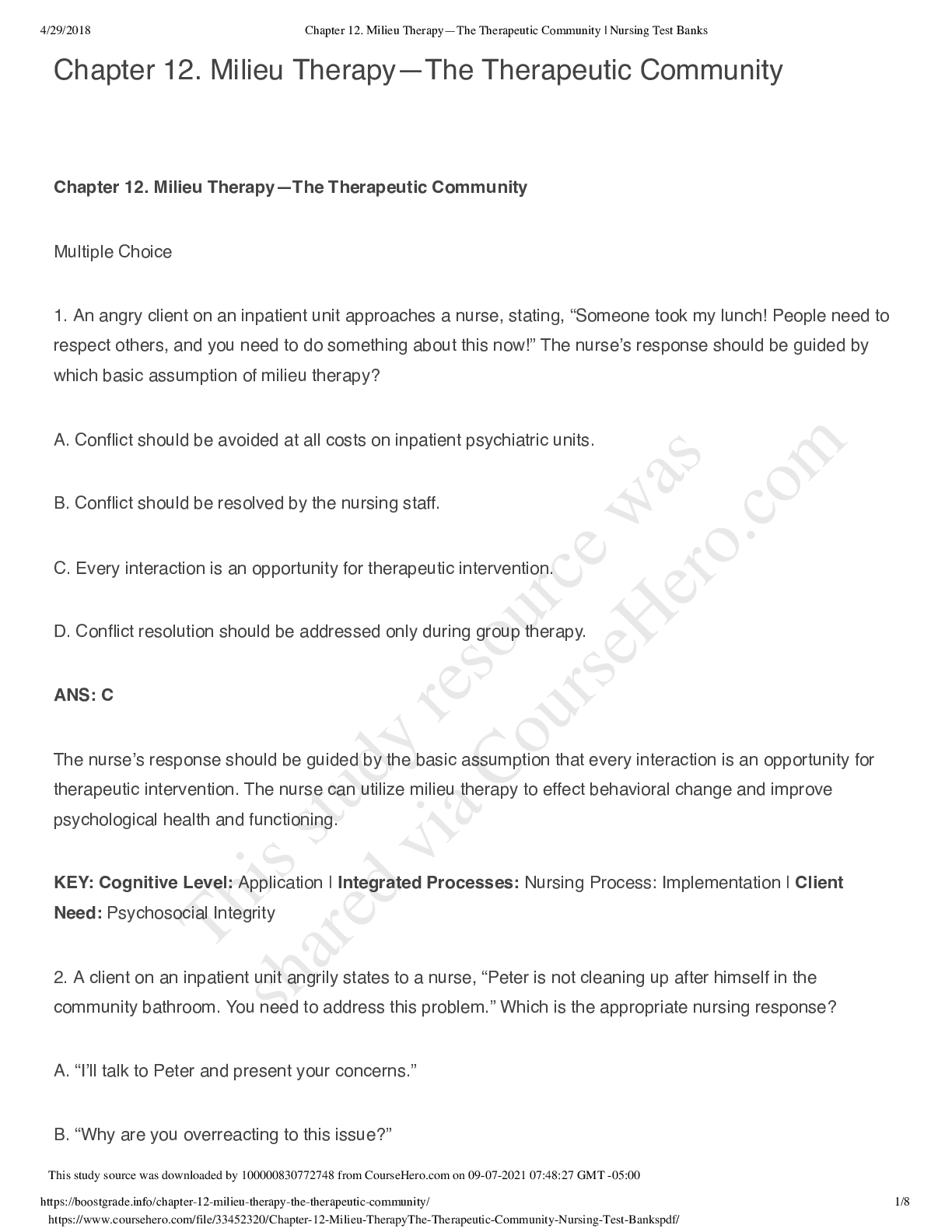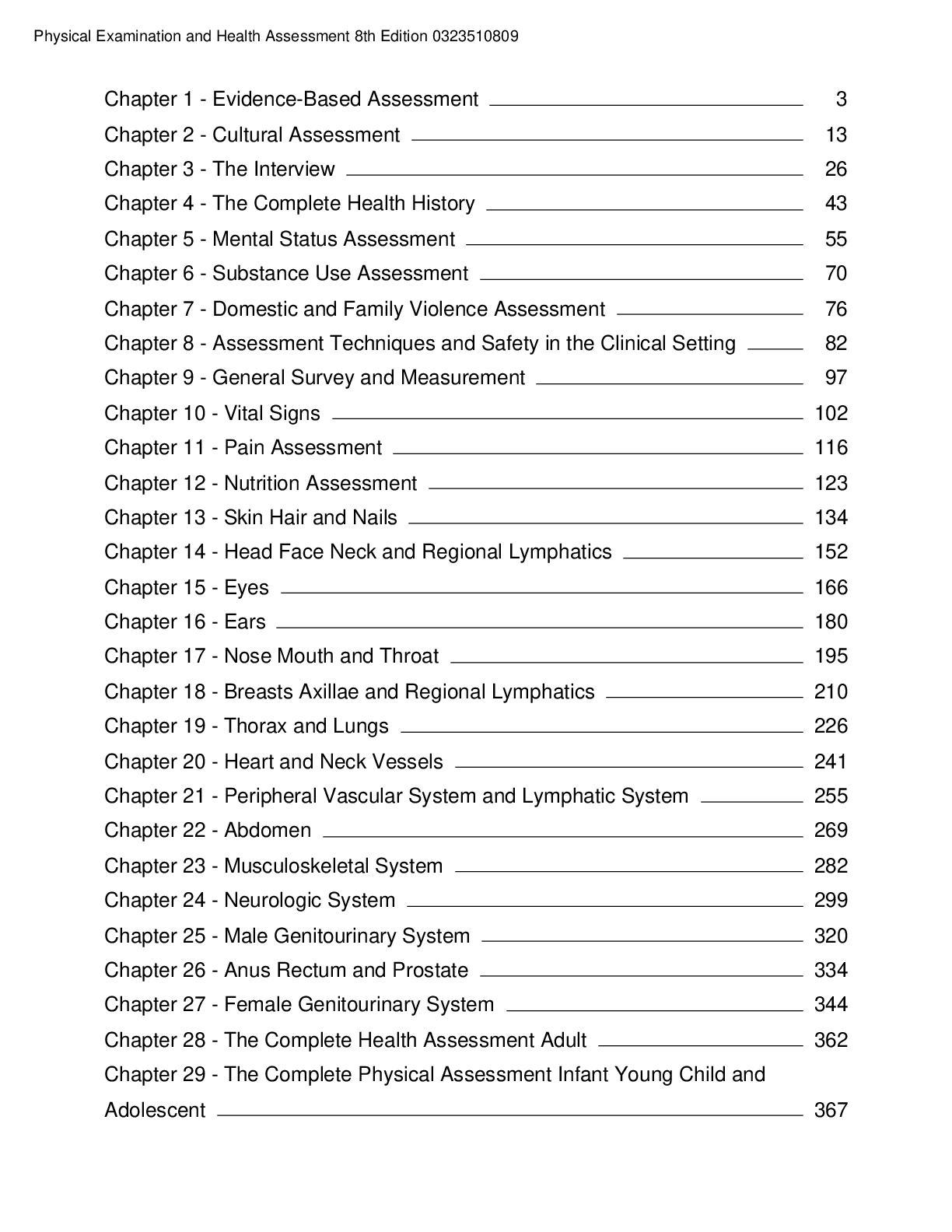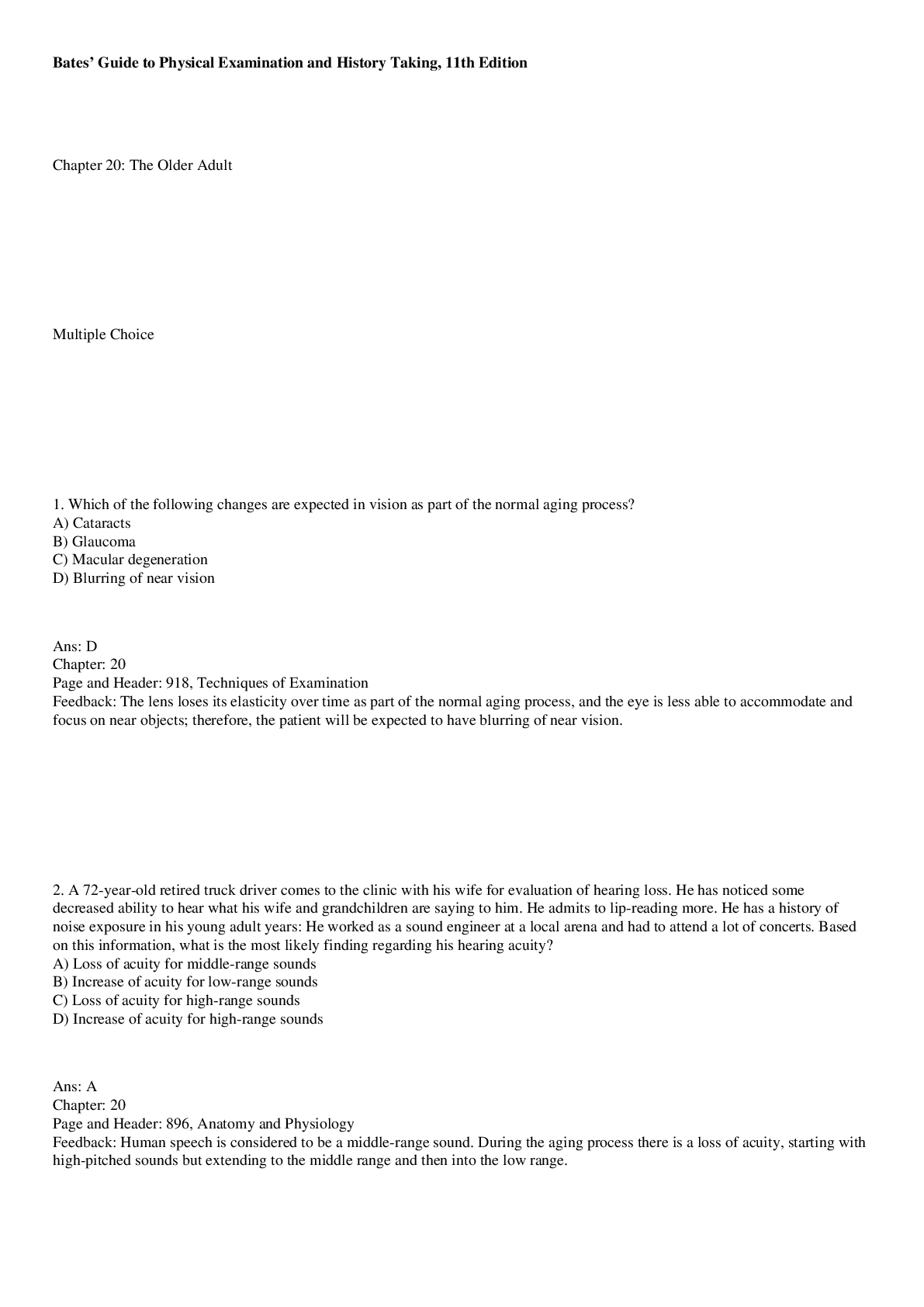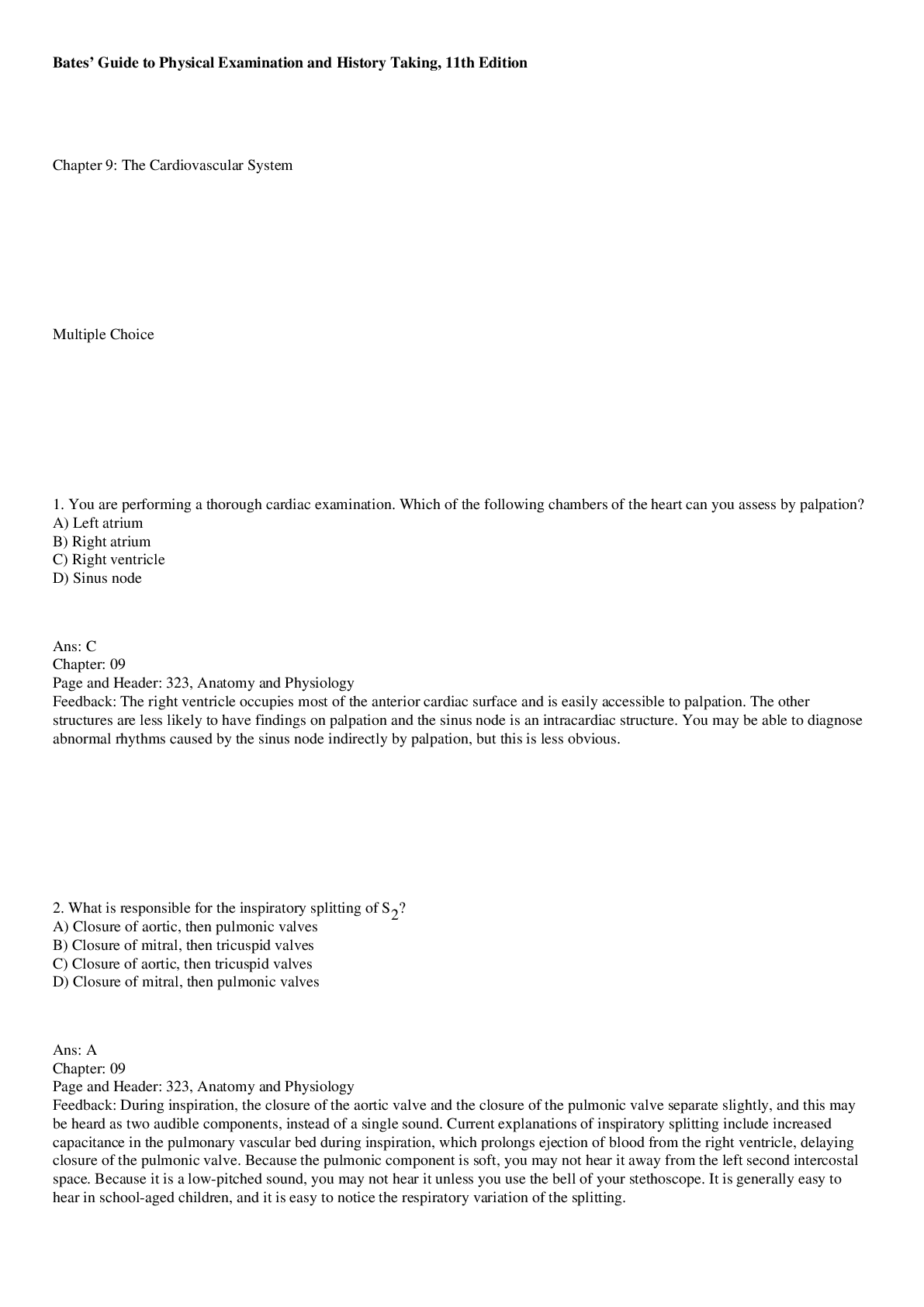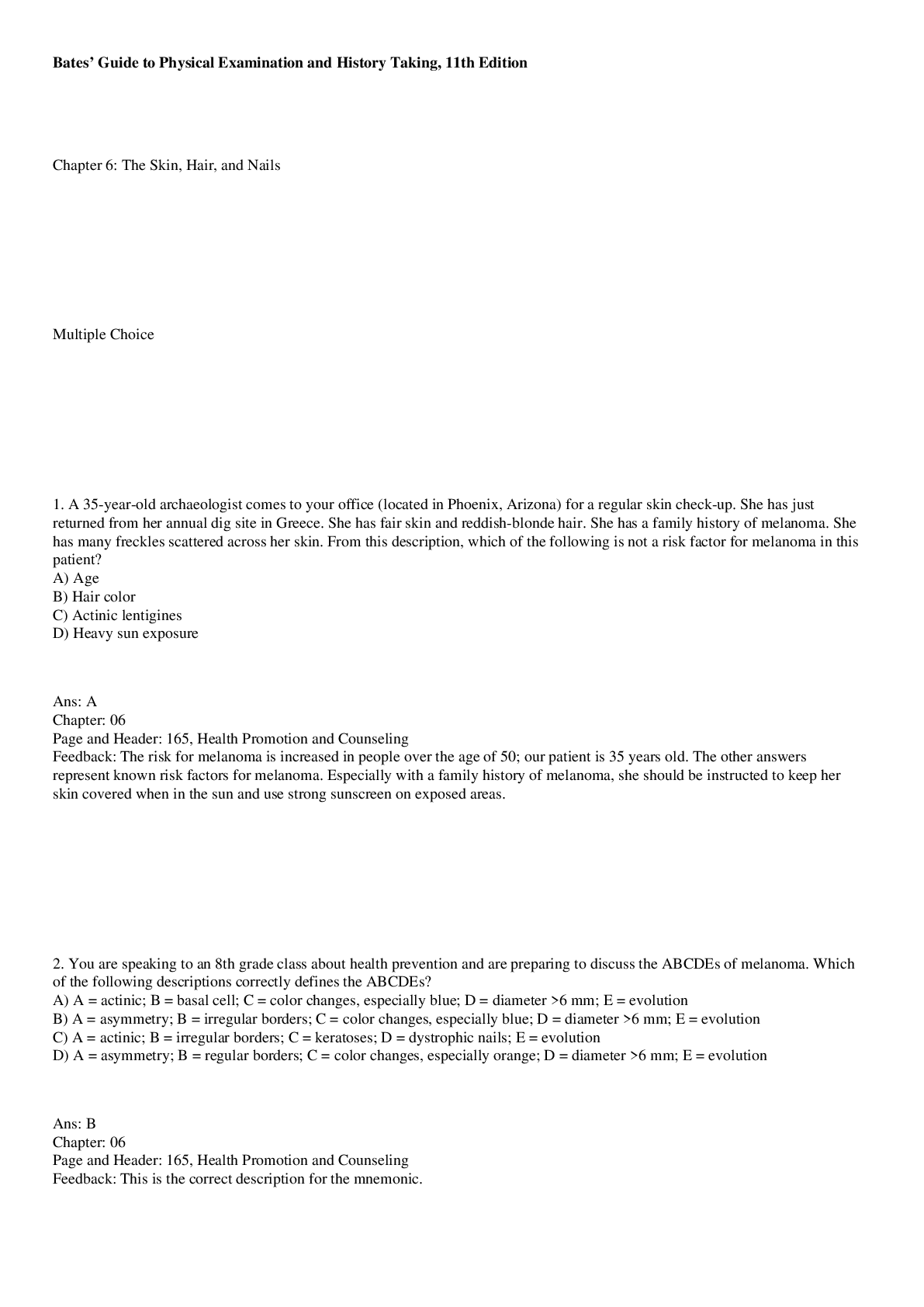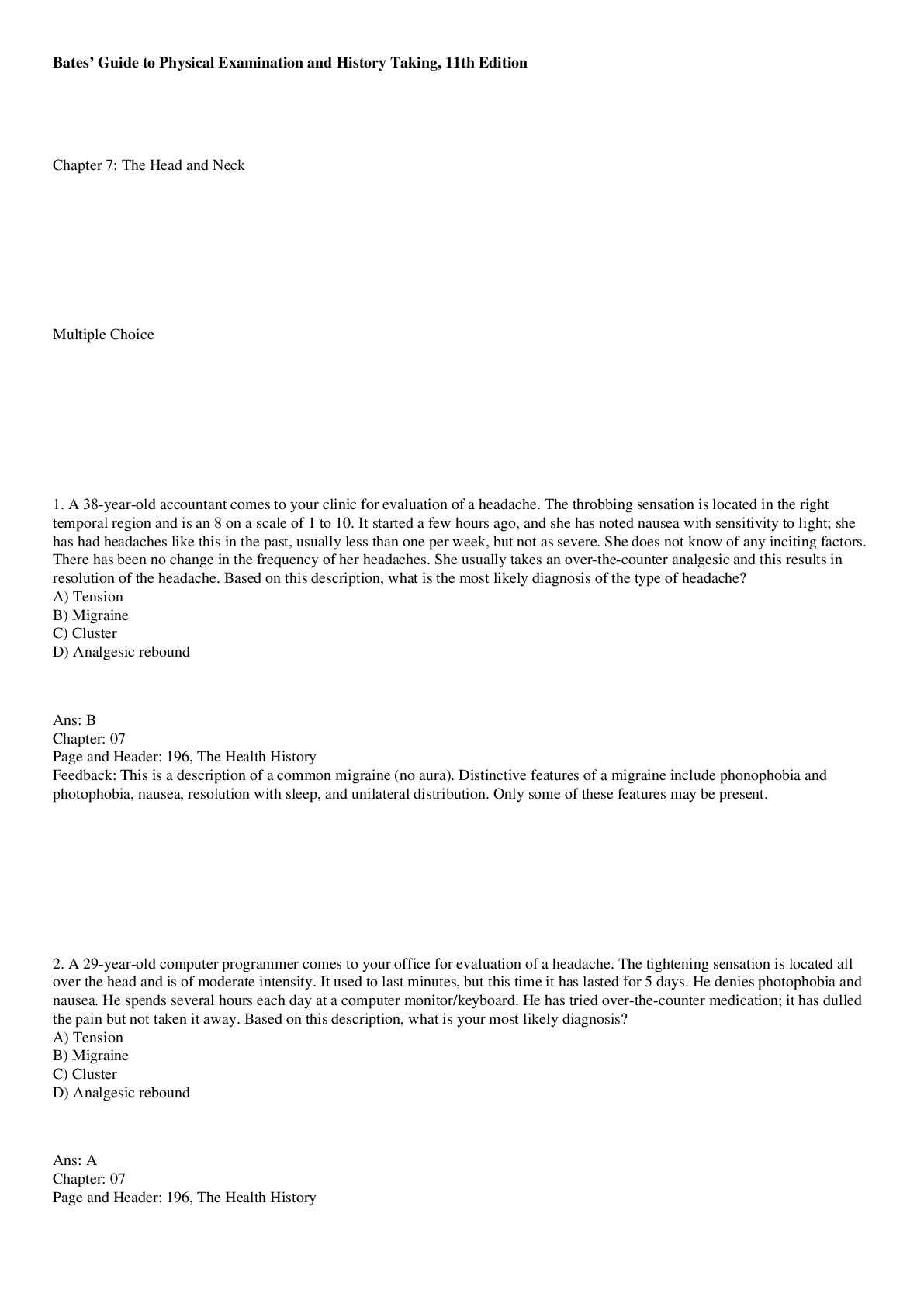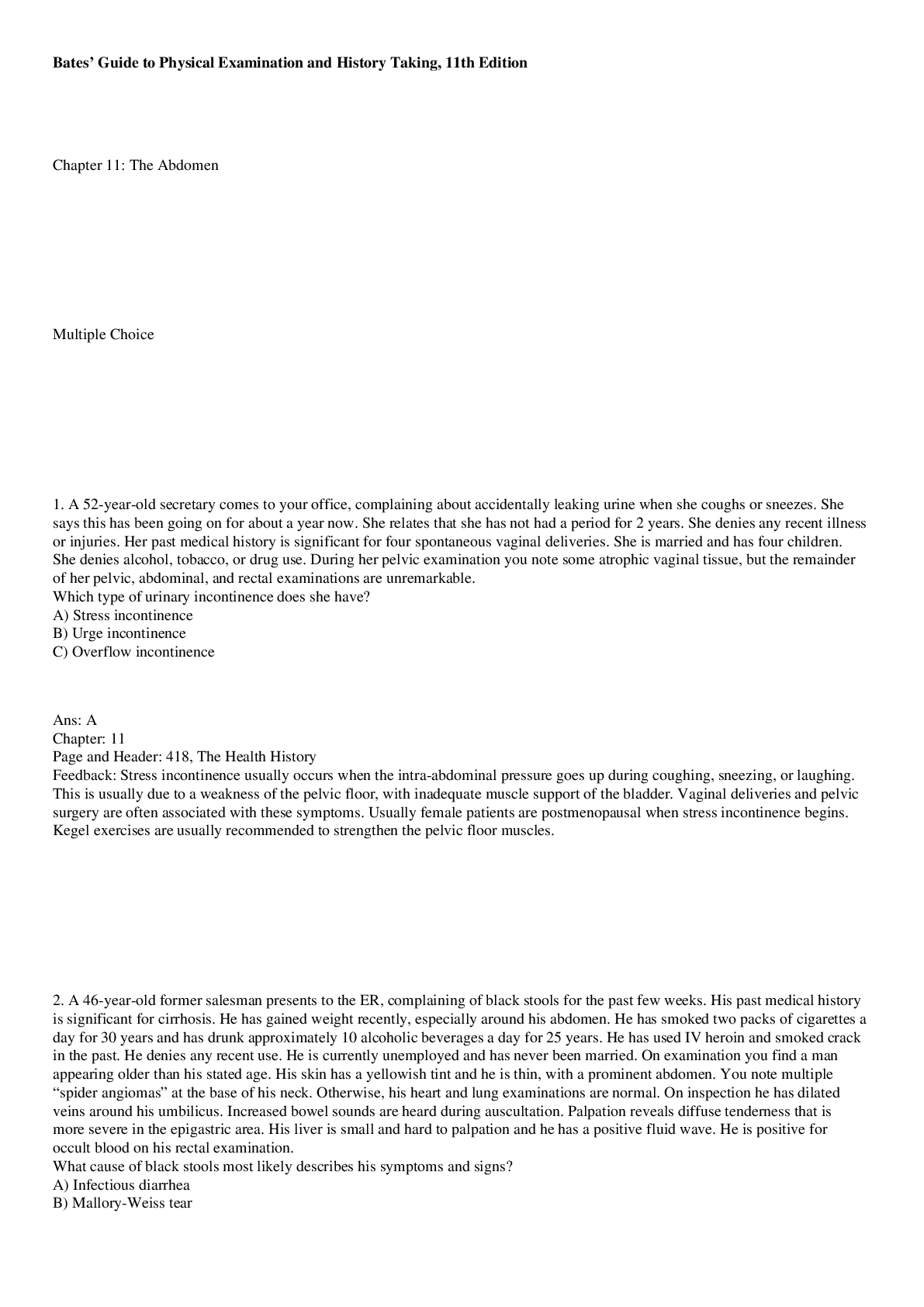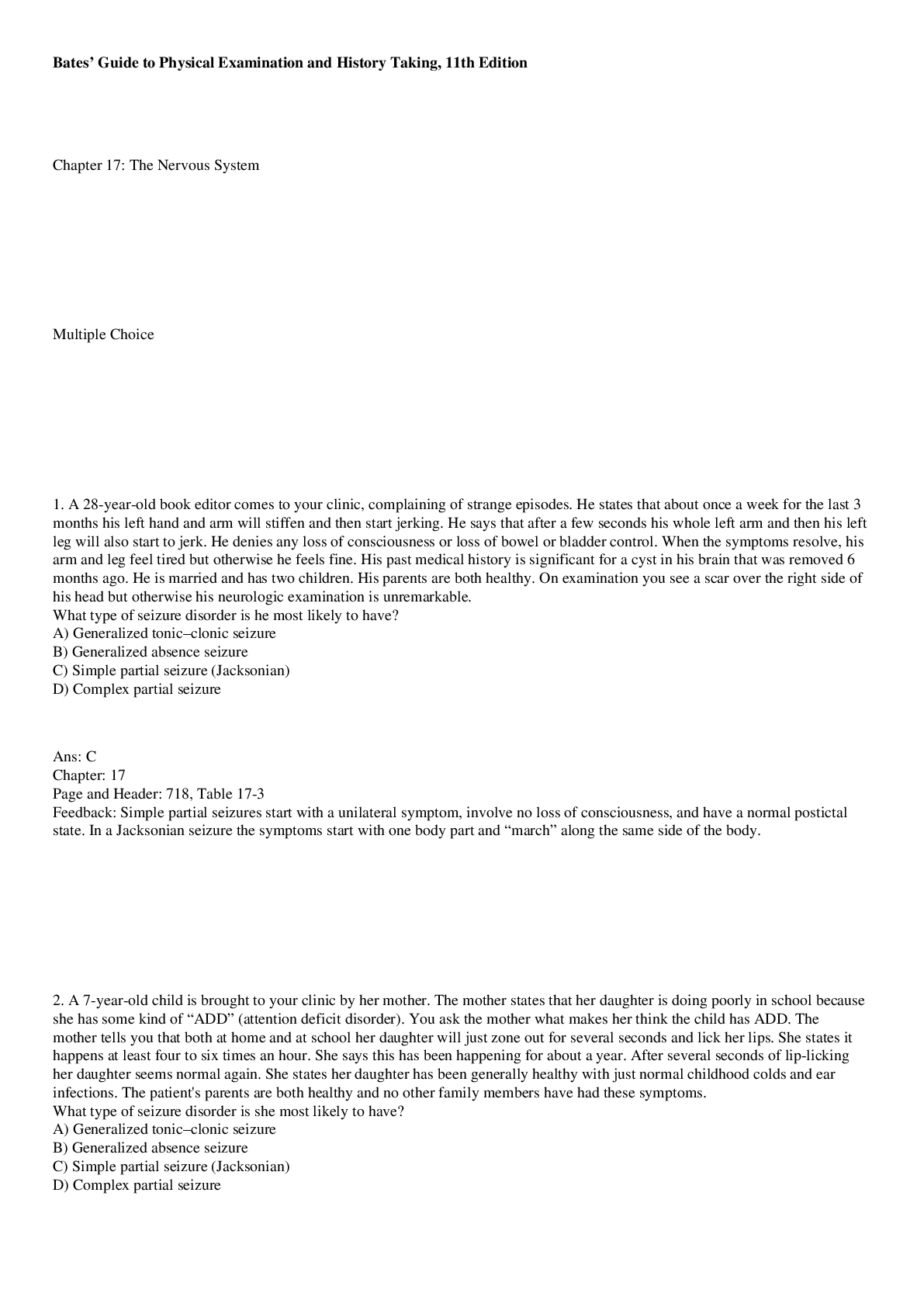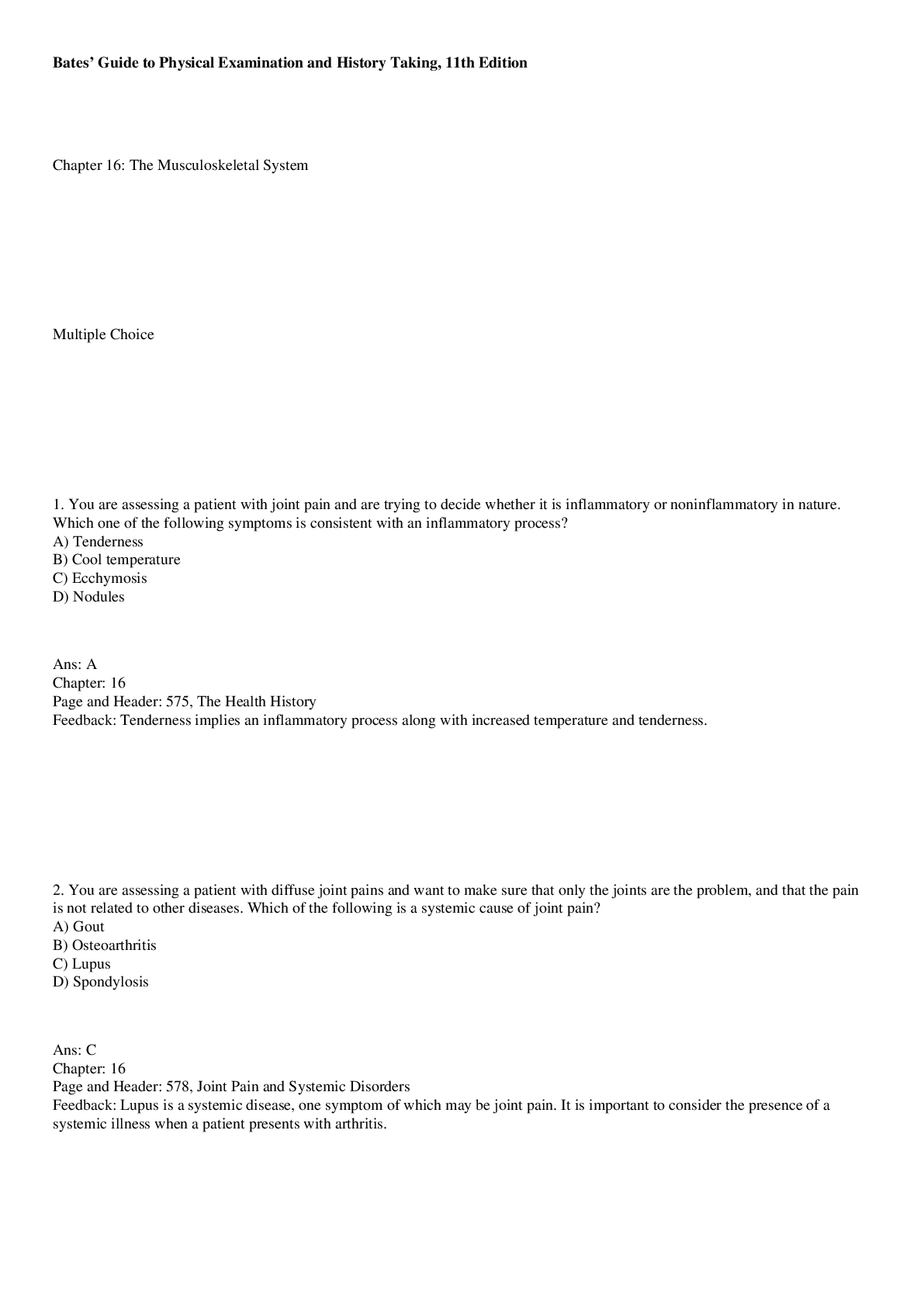*NURSING > TEST BANK > Chapter 11: The Abdomen ; Bates’ Guide to Physical Examination and History Taking, 12th Edition (All)
Chapter 11: The Abdomen ; Bates’ Guide to Physical Examination and History Taking, 12th Edition
Document Content and Description Below
Bates’ Guide to Physical Examination and History Taking, 12th Edition Chapter 11: The Abdomen Multiple Choice 1. A 52-year-old secretary comes to your office, complaining about accidentally leaki... ng urine when she coughs or sneezes. She says this has been going on for about a year now. She relates that she has not had a period for 2 years. She denies any recent illness or injuries. Her past medical history is significant for four spontaneous vaginal deliveries. She is married and has four children. She denies alcohol, tobacco, or drug use. During her pelvic examination you note some atrophic vaginal tissue, but the remainder of her pelvic, abdominal, and rectal examinations are unremarkable. Which type of urinary incontinence does she have? A) Stress incontinence B) Urge incontinence C) Overflow incontinence Ans: A Chapter: 11 Feedback: Stress incontinence usually occurs when the intra-abdominal pressure goes up during coughing, sneezing, or laughing. This is usually due to a weakness of the pelvic floor, with inadequate muscle support of the bladder. Vaginal deliveries and pelvic surgery are often associated with these symptoms. Usually female patients are postmenopausal when stress incontinence begins. Kegel exercises are usually recommended to strengthen the pelvic floor muscles. 2. A 46-year-old former salesman presents to the ER, complaining of black stools for the past few weeks. His past medical history is significant for cirrhosis. He has gained weight recently, especially around his abdomen. He has smoked two packs of cigarettes a day for 30 years and has drunk approximately 10 alcoholic beverages a day for 25 years. He has used IV heroin and smoked crack in the past. He denies any recent use. He is currently unemployed and has never been married. On examination you find a man appearing older than his stated age. His skin has a yellowish tint and he is thin, with a prominent abdomen. You note multiple “spider angiomas” at the base of his neck. Otherwise, his heart and lung examinations are normal. On inspection he TEST BANK FOR BATES' GUIDE TO PHYSICAL EXAMINATION AND HISTORY TAKING 12TH EDITION BY BICKLEY NURSINGTB.COM N U R S I N G T B . C O M has dilated veins around his umbilicus. Increased bowel sounds are heard during auscultation. Palpation reveals diffuse tenderness that is more severe in the epigastric area. His liver is small and hard to palpation and he has a positive fluid wave. He is positive for occult blood on his rectal examination. What cause of black stools most likely describes his symptoms and signs? A) Infectious diarrhea B) Mallory-Weiss tear C) Esophageal varices Ans: C Chapter: 11 Feedback: Varices are often found in alcoholic patients, but only when they have a diagnosis of significant cirrhosis. This patient has symptoms of cirrhosis, including jaundice, ascites, spider hemangiomas, and dilated veins on his abdomen (caput medusa). 3. A 21-year-old receptionist comes to your clinic, complaining of frequent diarrhea. She states that the stools are very loose and there is some cramping beforehand. She states this has occurred on and off since she was in high school. She denies any nausea, vomiting, or blood in her stool. Occasionally she has periods of constipation, but that is rare. She thinks the diarrhea is much worse when she is nervous. Her past medical history is not significant. She is single and a junior in college majoring in accounting. She smokes when she drinks alcohol but denies using any illegal drugs. Both of her parents are healthy. Her entire physical examination is unremarkable. What is most likely the etiology of her diarrhea? A) Secretory infections B) Inflammatory infections C) Irritable bowel syndrome D) Malabsorption syndrome Ans: C Chapter: 11 Feedback: Irritable bowel syndrome will cause loose bowel movements with cramps but no systemic symptoms of fever, weight loss, or malaise. This syndrome is more likely in young women with alternating symptoms of loose stools and constipation. Stress usually makes the symptoms worse, as do certain foods. 4. A 42-year-old florist comes to your office, complaining of chronic constipation for the last 6 months. She has had no nausea, vomiting, or diarrhea and no abdominal pain or cramping. She denies any recent illnesses or injuries. She denies any changes to her diet or exercise program. TEST BANK FOR BATES' GUIDE TO PHYSICAL EXAMINATION AND HISTORY TAKING 12TH EDITION BY BICKLEY NURSINGTB.COM N U R S I N G T B . C O M She is on no new medications. During the review of systems you note that she has felt fatigued, had some weight gain, has irregular periods, and has cold intolerance. Her past medical history is significant for one vaginal delivery and two cesarean sections. She is married, has three children, and owns a flower shop. She denies tobacco, alcohol, or drug use. Her mother has type 2 diabetes and her father has coronary artery disease. There is no family history of cancers. On examination she appears her stated age. Her vital signs are normal. Her head, eyes, ears, nose, throat, and neck examinations are normal. Her cardiac, lung, and abdominal examinations are also unremarkable. Her rectal occult blood test is negative. Her deep tendon reflexes are delayed in response to a blow with the hammer, especially the Achilles tendons. What is the best choice for the cause of her constipation? A) Large bowel obstruction B) Irritable bowel syndrome C) Rectal cancer D) Hypothyroidism Ans: D Chapter: 11 Feedback: Many metabolic conditions can interfere with bowel motility. In this case the patient has many symptoms of hypothyroidism, including cold intolerance, weight gain, fatigue, constipation, and irregular menstrual cycles. On examination, thyromegaly and delayed reflexes can help to make the diagnosis. Medication will usually correct these symptoms. 5. A 22-year-old law student comes to your office, complaining of severe abdominal pain radiating to his back. He states it began last night after hours of heavy drinking. He has had abdominal pain and vomiting in the past after drinking but never as bad as this. He cannot keep any food or water down, and these symptoms have been going on for almost 12 hours. He has had no recent illnesses or injuries. His past medical history is unremarkable. He denies smoking or using illegal drugs but admits to drinking 6 to 10 beers per weekend night. He admits that last night he drank something like 14 drinks. On examination you find a young male appearing his stated age in some distress. He is leaning over on the examination table and holding his abdomen with his arms. His blood pressure is 90/60 and his pulse is 120. He is afebrile. His abdominal examination reveals normal bowel sounds, but he is very tender in the left upper quadrant and epigastric area. He has no Murphy's sign or tenderness in the right lower quadrant. The remainder of his abdominal examination is normal. His rectal, prostate, penile, and testicular examinations are normal. He has no inguinal hernias or tenderness with that examination. Blood work is pending. What etiology of abdominal pain is most likely causing his symptoms? A) Peptic ulcer disease B) Biliary colic C) Acute cholecystitis D) Acute pancreatitis TEST BANK FOR BATES' GUIDE TO PHYSICAL EXAMINATION AND HISTORY TAKING 12TH EDITION BY BICKLEY NURSINGTB.COM N U R S I N G T B . C O M Ans: D Chapter: 11 Feedback: Acute pancreatitis causes epigastric and left upper quadrant pain and often radiates into the back. There is often a history of long-standing gallbladder disease or recent alcohol ingestion. Severe abdominal pain and vomiting are often seen. Medications such as proton pump inhibitors can also cause pancreatitis in people without these other risk factors. Treatment includes hydration, pain management, and bowel rest. 6. A 76-year-old retired farmer comes to your office complaining of abdominal pain, constipation, and a low-grade fever for about 3 days. He denies any nausea, vomiting, or diarrhea. The only unusual thing he remembers eating is two bags of popcorn at the movies with his grandson, 3 days before his symptoms began. He denies any other recent illnesses. His past medical history is significant for coronary artery disease and high blood pressure. He has been married for over 50 years. He denies any tobacco, alcohol, or drug use. His mother died of colon cancer and his father had a stroke. On examination he appears his stated age and is in no acute distress. His temperature is 100.9 degrees and his other vital signs are unremarkable. His head, cardiac, and pulmonary examinations are normal. He has normal bowel sounds and is tender over the left lower quadrant. He has no rebound or guarding. His rectal examination is unremarkable and his fecal occult blood test is negative. His prostate is slightly enlarged but his testicular, penile, and inguinal examinations are all normal. Blood work is pending. What diagnosis for abdominal pain best describes his symptoms and signs? A) Acute diverticulitis B) Acute cholecystitis C) Acute appendicitis D) Mesenteric ischemia Ans: A Chapter: 11 Feedback: Diverticulitis is caused by localized infections within the colonic diverticula. Constipation, fever, and abdominal pain are common. Mesenteric ischemia classically presents in older people with a history of vascular disease elsewhere. The typical pain is unusual in that it is not made worse by examination despite being severe. Some mistake this feature to indicate malingering, with bad results. 7. A 77-year-old retired bus driver com [Show More]
Last updated: 1 year ago
Preview 1 out of 15 pages
Instant download

Buy this document to get the full access instantly
Instant Download Access after purchase
Add to cartInstant download
Reviews( 0 )
Document information
Connected school, study & course
About the document
Uploaded On
May 06, 2022
Number of pages
15
Written in
Additional information
This document has been written for:
Uploaded
May 06, 2022
Downloads
0
Views
105


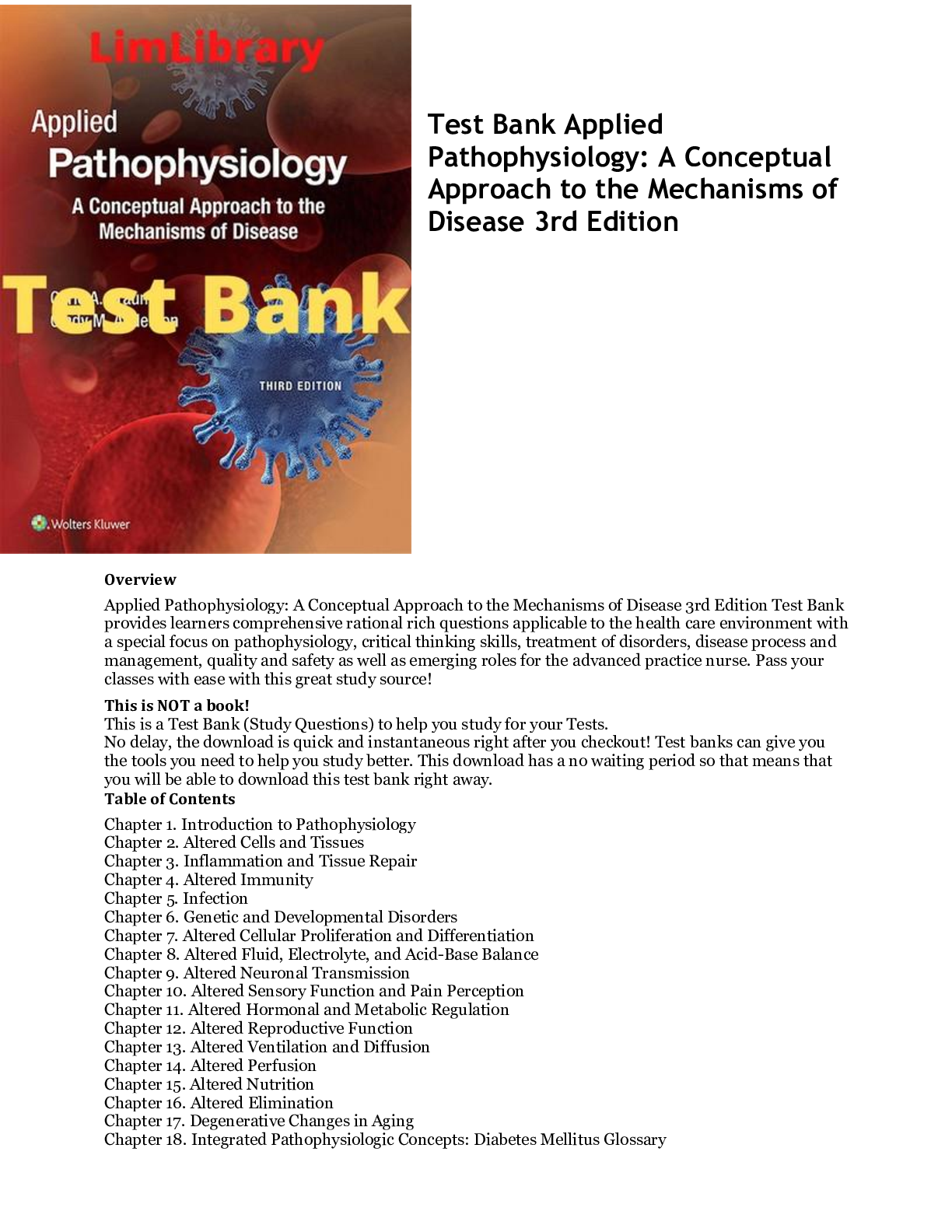

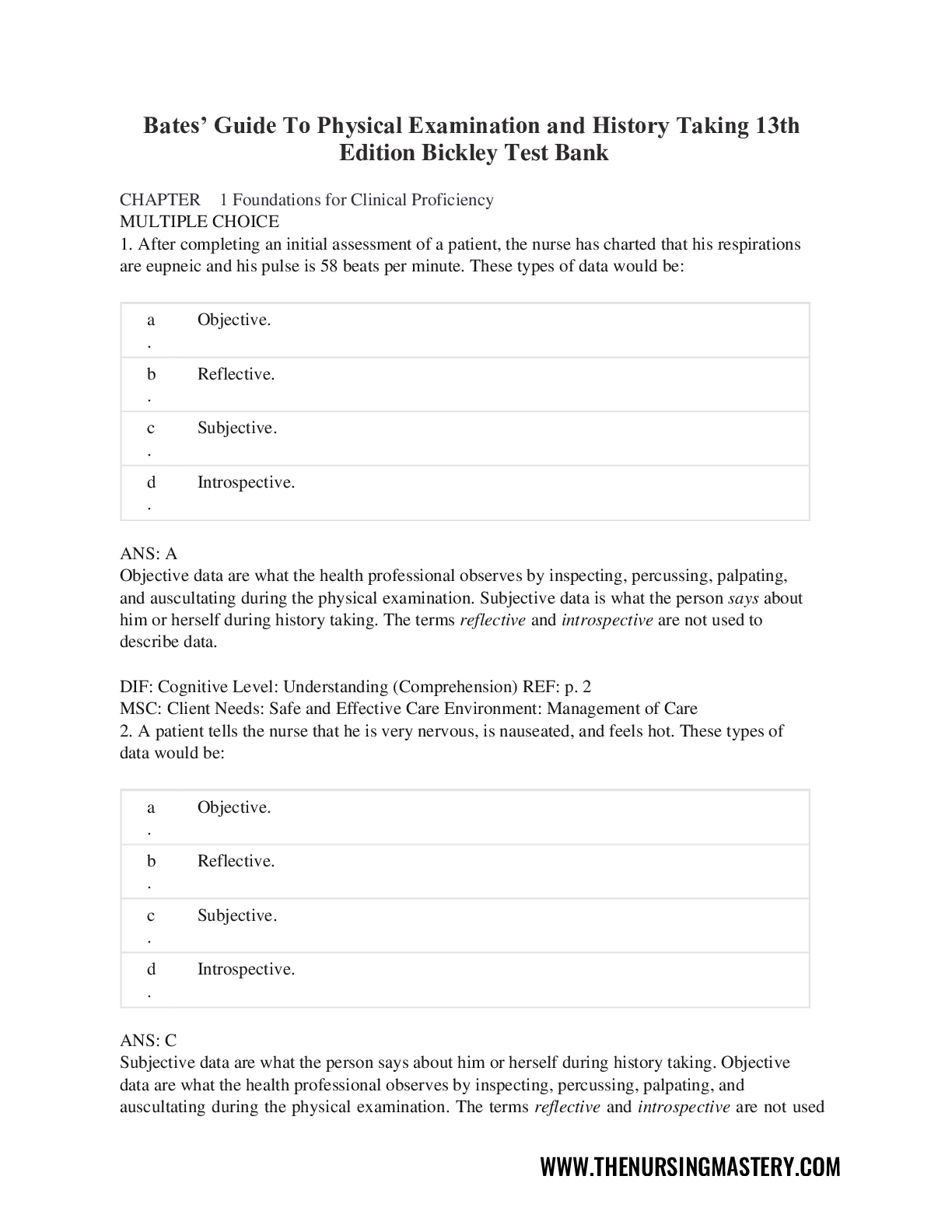
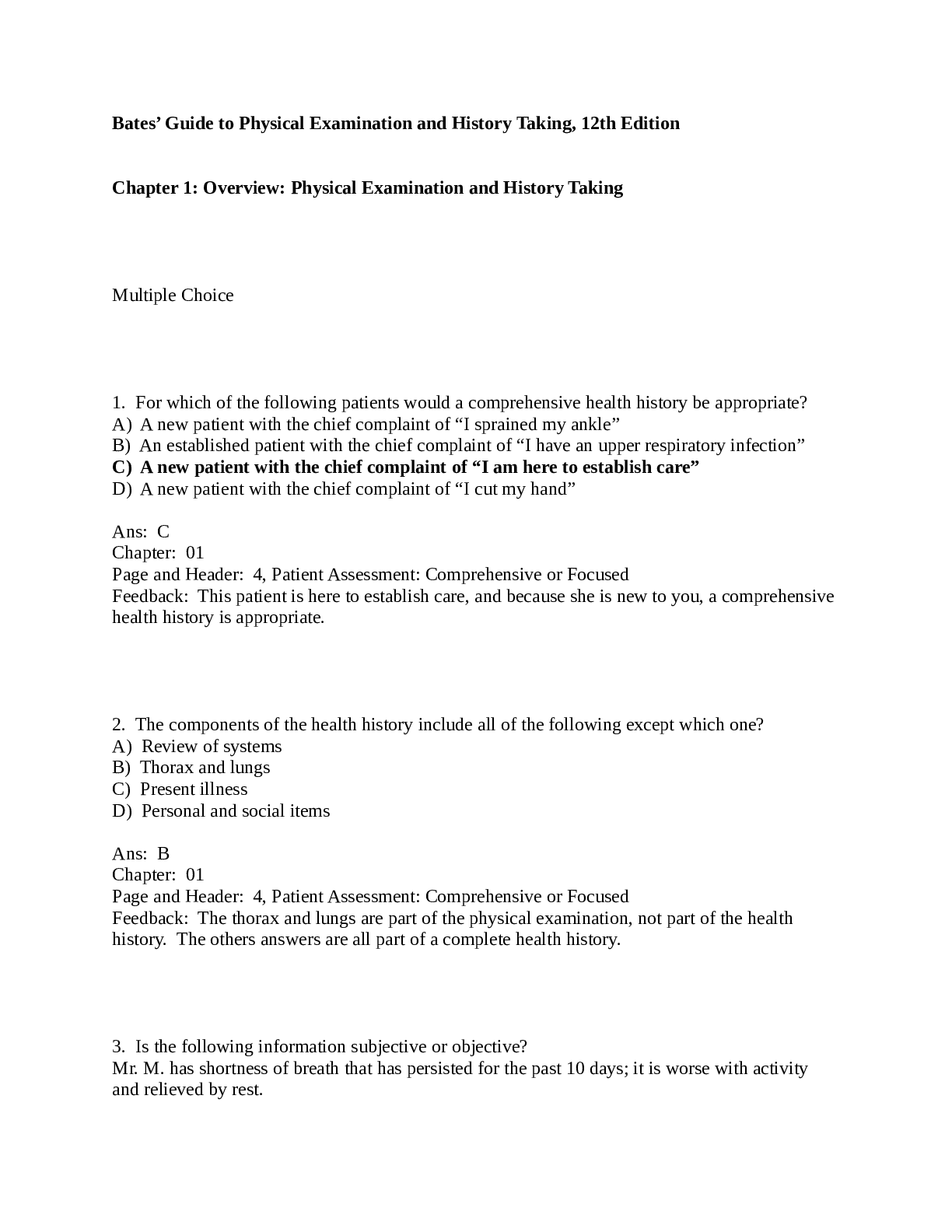
.png)
.png)
.png)

